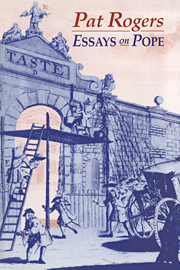Book contents
- Frontmatter
- Contents
- Preface
- Acknowledgements
- List of abbreviations
- 1 Pope and the syntax of satire
- 2 The politics of style
- 3 Form and pattern in the Pastorals
- 4 Windsor-Forest, Britannia and river poetry
- 5 Faery lore and The Rape of the Lock
- 6 Timon's Villa and Chatsworth
- 7 A drama of mixed feelings: the Epistle to Arbuthnot
- 8 The name and nature of Dulness: proper nouns in The Dunciad
- 9 Pope and the social scene
- 10 Blacks and poetry and Pope
- 11 The case of Pope v. Curll
- 12 Pope and his subscribers
- 13 The Burlington circle in the provinces: Pope's Yorkshire friends
- 14 Pope and the antiquarians
- Index
14 - Pope and the antiquarians
Published online by Cambridge University Press: 18 December 2009
- Frontmatter
- Contents
- Preface
- Acknowledgements
- List of abbreviations
- 1 Pope and the syntax of satire
- 2 The politics of style
- 3 Form and pattern in the Pastorals
- 4 Windsor-Forest, Britannia and river poetry
- 5 Faery lore and The Rape of the Lock
- 6 Timon's Villa and Chatsworth
- 7 A drama of mixed feelings: the Epistle to Arbuthnot
- 8 The name and nature of Dulness: proper nouns in The Dunciad
- 9 Pope and the social scene
- 10 Blacks and poetry and Pope
- 11 The case of Pope v. Curll
- 12 Pope and his subscribers
- 13 The Burlington circle in the provinces: Pope's Yorkshire friends
- 14 Pope and the antiquarians
- Index
Summary
We all know that Pope, like his fellow members of the Scriblerian group, was against the antiquarians. He must have been. Were not antiquarians the sort of people who, in the manner of Scott's Jonathan Oldbuck, mistook commonplace domestic objects for ancient relics? Did they not invent absurd explanations for Stonehenge, dream up fanciful Trojan origins for the British, fantasize about the wanderings of the peoples, and track down Hyperborean sources in every rivulet of European history? Were they not regularly misled by ingenious but totally unfounded etymological reasoning? Did they not reconstruct Babel by their preposterous ethnologies of the tribes of Noah? Were they not literal-minded to the point that they accepted any ancient gnomic statement as Holy Writ? Did they not convince themselves that modern men and women were puny descendants of a once Titanic race? Cannot we see them as shading into the much derided virtuosi who collected things for their oddity value, rather than for their real historic worth? And were they not linked to the equally suspect class of dilettanti, who looted the archeological sites of Greece, Rome and the Middle East, as well as Britain itself? Were not many in the eighteenth century actually members of the Dilettanti Society, of whom Horace Walpole famously said that the nominal qualification was to have studied virtu in Rome, but the real mark was to have got drunk there? In short, are they not at best a collection of amiable enthusiasts?
The answer to all these questions is a qualified yes. Each description fits some of the antiquarians some of the time, but none applies to all of the antiquarians all of the time.
- Type
- Chapter
- Information
- Essays on Pope , pp. 240 - 260Publisher: Cambridge University PressPrint publication year: 1993
- 2
- Cited by

